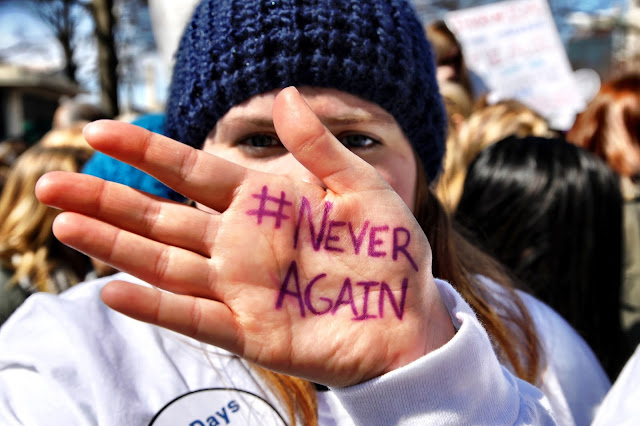Until recently, advocates for gun control hadn’t realized what their movement was missing: fearless, outraged teen-agers. On Saturday morning, in Washington, D.C., students and parents gathered to protest the lenient gun laws that allow for endless mass shootings in America. Many had orange price tags dangling from their wrists: $1.05, the amount the National Rifle Association donated to the Republican Senator Marco Rubio, divided by the number of students in Florida, the state he represents. A massive sound system broadcast pop songs: Kesha’s “Tic-Toc,” Britney Spears’s “Toxic,” the Killers’ “Mr. Brightside.” The mood was celebratory, but determined.
The March for Our Lives was organized by a group of tough and eloquent young survivors of the recent massacre at Marjory Stoneman Douglas High School, in Parkland, Florida. The point of today’s action is to insure “that a comprehensive and effective bill be immediately brought before Congress to address these gun issues.”
By noon, it was impossible to move easily through the crowd. Teens waved homemade signs (“Hunting Season is Over”; “No, I’m Pretty Sure Guns Kill People”) and huddled together for photos. Poppy Fleming, a nine-year-old student at Hartwood Elementary, in Stafford County, Virginia, stood with Deborah and Michael Fleming, her grandparents. She held up a sign decorated with the names and locations of various mass shootings. In the middle, she’d written, in magic marker, “Am I Next?”
“We can teach her about civil disobedience,” Deborah said. “We can teach her how to vote.”
“Yes!” Poppy shouted. “Nine years away.” She was wearing a black knit hat with “Resist” stitched along the brim. She told me she’d gotten it at Busboys and Poets, a community space founded by Anas Shallal, an Iraqi-American artist and activist.
After every mass shooting, there’s a public outcry, but it frequently fades without real progress; something feels profoundly different this time. The energy on the street was crackling, undeniable. How do you define or explain a tipping point? The night before, on CNN, I watched the parents of Lauren Milgram, a Sandy Hook survivor—Lauren was seven years old when she encountered an active shooter at her elementary school, and hid in a bathroom with her classmates and teacher—tell a reporter they had been “too polite” after the incident. Young people have certainly been instrumental to political upheavals before—in 1960, in Greensboro, North Carolina, four black men, none older than nineteen, sat down at a segregated Woolworth’s lunch counter and refused to leave (a portion of that lunch counter is now on display here, less than a mile from the rally, in the National Museum of American History). At this particular moment, they feel like our only hope for change.
Gayle Morris, sixty-four, and Joanne Zinski, sixty-two, are both school psychologists in Palm Harbor, Florida. I asked them what they thought was different this time—why half a million marchers had suddenly mobilized. “It’s these Parkland students,” Zinski said. “We are here to support them. It took a group that was willing to push back the grief to action. For some reason, they’ve sparked something—for America, and I know in us.” Morris agreed: “Sandy Hook, those parents, that community, they did wonderful things, but they couldn’t get the momentum. Teen-agers are so powerful.”
Most speakers today were under the age of twenty-one, but beyond that, the students who addressed the crowd in D.C. were united by the ways in which guns have negatively affected their lives. Jaclyn Corin, a seventeen-year-old Parkland survivor, spoke about how her community is made up of many “privileged individuals” whose voices are often given more space—yet she acknowledged the “communities of all classes” that have been decimated by gun violence. “We share the stage today and forever,” she said. After her speech, Corin brought Yolanda King, the granddaughter of Martin Luther King, Jr., to the stage. The Parkland students seem to instinctively understand that their fight not only crosses racial and class lines but also exists on a historical continuum, as an extension of the civil-rights movement. King led the crowd in a chant: “Spread the word! Now you heard! All across the nation! We are going to be! A great generation!”


No comments :
Post a Comment